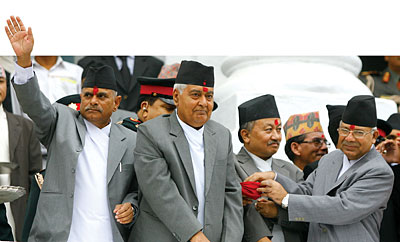 KIRAN PANDAY |
In January, there appeared to be a breakthrough in the political process. After a three-day strike, Maoists pulled back from planned protests, the High Level Political Mechanism was finally set up. The process of discharging disqualified combatants began, and the Maoists allowed the parliament to function. A bit later, Prachanda and Baburam Bhattarai appeared to patch up, and the party decided to pursue the 'peace and constitution' line. Observers saw the developments as a remarkable breakthrough, but nine months later, the stalemate persists.
But there is a similar flutter now. The Maoists have agreed to place their combatants under the Special Committee. A secretariat is being formed, and Maoist commanders are planning to branch out to the cantonments to prepare their lot. The PM has told security chiefs to be ready for integration. Maoists have agreed to be 'sensitive' to the army's operational issues. And Prachanda is all ready to withdraw his candidature (though latest reports suggest he will not do so if Ram Chandra Poudel does not reciprocate).
The threat of UNMIN leaving has worried the Maoists. There is a broad international consensus (with India, USA and UK on the same side) that the onus rests largely on the Maoists to move on the peace process. Maoists know that if they want a constitution, they will have to make fundamental compromises on their party structure. And besides the tactical victory of breaking the 'democratic alliance', Prachanda has little to show for the past few months.
But the fundamental factors that led to the stalemate in the first place have not changed, which is why it would once again be naÔŅĹve to see recent developments as a breakthrough. The Maoists are in the throes of one of their deepest ideological crises ever, compounded by personality clashes.
What is the kind of political system the Maoists aim to build in Nepal? What can it settle for in the interim, and what are the non-negotiables in the new constitution? Would it help or be a great betrayal to give up the PLA at a time when the revolution remains incomplete, the reactionaries have consolidated, and prospect of political power for the party remains distant? Who is the main enemy? What is the purpose of integration if the original intent of using it to make NA a friendly force is no longer possible? And how does it see India? Without clarity, cohesion and flexibility on at these issues, the Maoists will not make any substantive movement and others will not give them space.
And what is the nature of compromises the other side is willing to make? It is easy to blame the Maoists for not having moved on integration when they were in power. But just go back to Sushil Koirala's statements during the period, when he insisted that "not a single combatant" can be integrated, or Bidya Bhandari's approach of the past year.
To be fair, there is greater flexibility among them now but all non- Maoist parties echo the NA's redlines: no unit level entry, no space in the command structure, the minimum possible in the army while the rest can go to other forces. Additionally, if the NC believes a parliamentary system is the only option, wants the weakest form of federalism possible, and is reluctant to even discuss reforming the 1990s state institutions, where is the meeting point? Where is the incentive for the Maoists who are being told to give up their army, compromise on their political issues in the statute, and wait before getting space in the power structure?
Inter-related is the India-Maoist bitterness. Both have genuine grudges, have invested a lot in countering the other and Delhi, till now, has come out far more successful in the game. India will not budge till it feels that Maoists have turned 'democratic' and will be 'sensitive' to its concerns For his part, Prachanda feels India wants to destroy him politically, and irrespective of the compromises he makes, Delhi will not give him space. Insecurities and belligerence on both sides has led to a vicious cycle.
Don't fall for it when politicians say they will finish all the remaining tasks of the peace process in four months. This is logistically impossible, and there is neither the intention nor the capacity to do so among the forces which matter.
READ ALSO:
Peace and the PM, PUBLISHER'S NOTE
Trickle up, DAVID SOGGE



